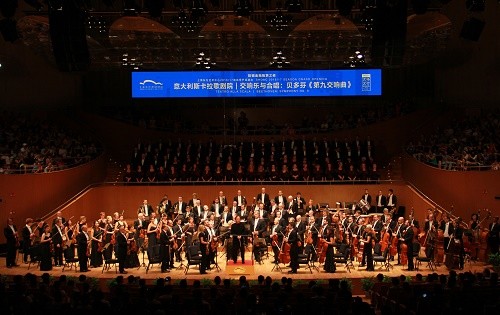 China Beethoven: Soloists, Chorus and Orchestra of Teatro alla Scala, Bruno Casoni (chorus master), Myung-Whun Chung (conductor), Shanghai Oriental Arts Center, Shanghai, 4.9.2016. (RP)
China Beethoven: Soloists, Chorus and Orchestra of Teatro alla Scala, Bruno Casoni (chorus master), Myung-Whun Chung (conductor), Shanghai Oriental Arts Center, Shanghai, 4.9.2016. (RP)

Beethoven – Symphony No.9 in D minor Op.125
Soloists:
Soprano – Eva Mei
Mezzo Soprano – Michelle Breedt
Tenor – Michael Schade
Bass – Detlef Roth
Any performance of Beethoven’s Ninth Symphony is an occasion. At the conclusion of this concert, the second in as many days by the chorus and orchestra of La Scala under the baton of Myung-Whun Chung at the Shanghai Oriental Arts Center, conductor, soloists and orchestra were greeted with rapturous applause. When Chung, however, turned to acknowledge the chorus, the audience exploded. That was the only reasonable response.
One is apt to encounter stirring performances of this magnificent music, but you are unlikely to often hear the sound produced by the La Scala opera chorus. It was nothing short of phenomenal. Approximately 100 in number, the chorus sang with richness of tone, assured musicianship and supreme artistry: the mark of true professionals making music. Bruno Casoni, La Scala’s chorus master, surpassed his goal (as stated on the company’s website) to achieve ‘that typical opera stage sound, powerful and moving at the same time’. There was nothing typical about it, although it was certainly powerful and moving.
Beethoven’s Ninth has many arduous passages for the sopranos of the chorus, who have to sing no fewer than 75 high A’s, but I have never heard the exposed line ‘Such’ ihn überm Sternenzelt!, Über Sternen muss er wohnen’ (‘Seek Him above the canopy of stars! Surely He lives above the stars’) sung with such an ethereally beautiful, sparkling tone. I’ve always thought that one is standing on a precipice when preparing to sing the tenor line in the next section which begins ‘Seid umschlungen, Millionen!’ (‘Be embraced, you multitudes!’). It is either a leap into the abyss or a flight into the heavens. The La Scala tenors, taking their lead from the sopranos, soared upwards with gleaming, ringing tone. The vibrant alto sound beneath had to be heard to be believed. The baritones and basses were equally fine – rock solid and resonant.
The solo quartet that partnered with the chorus in the finale was of the same caliber. As always, Detlef Roth sang with rounded tone, buoyant high spirits and attention to textual nuances. Michael Schade’s singing was forthright in the Turkish March, and at ease in the high tessitura that Beethoven demands of the tenor throughout. Is there any more treacherous and exposed ascent to a high B flat for a soprano in the repertoire than in the quartet’s final extended passage? Eva Mei made it seem practically effortless, and the climax after the arduous ascent was lovely. Mezzo-soprano Michelle Breedt rounded out the quartet with aplomb.
As with Verdi’s Simon Boccanegra the evening before, Chung conducted from memory. His technique is often minimalistic, simply a nod of the head or the smallest of gestures, with broader, more emphatic ones used sparingly. His Beethoven’s Ninth is refined, lyrical and perfectly proportioned. There are loud, wonderful moments, but they are always part of the overall scale of the work. He paid great attention to the text in the finale, with the focus always on its meaning and place in the musical line and texture.
Which leaves only the orchestra to comment upon. It’s always fun to watch opera orchestras out of the pit and on a concert stage. Their faces and bodies communicate a real enthusiasm in performing music outside of their regular repertoire. Accustomed to coordinating with singers and dancers (and heaven only knows what else nowadays) in an opera performance, they watch the conductor closely, and engage readily with other players, creating an almost chamber music-like atmosphere. The La Scala orchestra is a fine ensemble, but a few sections made you sit up and really take notice. The horns are excellent, whether playing as an ensemble in the first movement or in the solo passages of the second, and likewise the woodwinds. The warmth and richness of the cellos, also noteworthy, showed to terrific advantage in the third movement.
Reviewers are apt to comment on audience behavior, and I’m happy to report that there were very few breaches of concert-going etiquette on this occasion. No jarring applause punctuated the brief pauses between movements, and the coughing was on a par with that in either New York or Zurich. It is next to impossible, however, to stop anyone from sneaking a few minutes of video, but that is a silent activity, and in this instance, relatively discreet. We have the vigilant ushers to thank for that.
Rick Perdian
